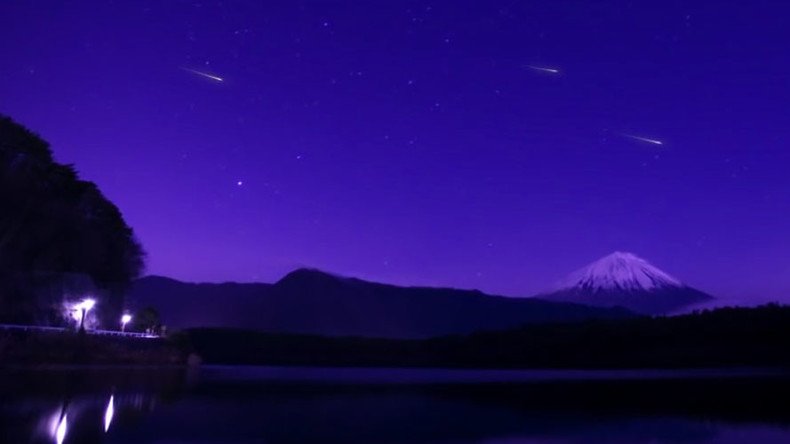Man-made meteor shower to dazzle skies at 2020 Olympics (VIDEO)

A Japanese startup is aiming for the stars, literally, after detailing plans to create a man-made meteor shower for the opening ceremony of the Tokyo Olympics in 2020.
Known as ‘Sky Canvas,’ the pyrotechnics show will be visible across an area of 200km (125 miles), about 400-times wider than a usual fireworks display.
To do this, the startup called Star-ALE will launch a micro satellite into space packed with up to 1,000 pellets of various gases and elements.
The little meteor makers will then be blasted out of the satellite when they’re in the correct location and, at an altitude of between 35 to 50 miles above Earth, “burn, burn, burn like fabulous yellow roman candles exploding like spiders across the stars and in the middle you see the blue centerlight pop and everybody goes ‘Awww!’”
Each material will emit a different color upon re-entry with potassium burning purple, calcium orange, copper green, and so on.
Star-ALE to create meteor shower over #Tokyo for 2020 #Olympics: https://t.co/Q9xtK01kyU#meteors#vacuumchamberpic.twitter.com/Yqry878DjD
— MDC Vacuum Products (@MDCVacuum) May 20, 2016
“It is artificial, but I want to make really beautiful [meteors] that can impress viewers,” Lena Okajima, CEO and founder of ALE, told AFP.
While this will create quite an impressive sight, it’s certainly not cheap, with each pellet priced around US$8,100, plus the cost of launching the satellite, pushing the final bill to millions of dollars.
This isn’t the first time the skies have been controlled for the Olympics.
Chinese authorities used more than 1,000 rockets to ensure a rain-free opening ceremony for the 2008 Olympics in Beijing.
The rockets were loaded with iodine to seed the clouds, which can either disperse rainfall earlier than would naturally occur or induce rain during droughts.












